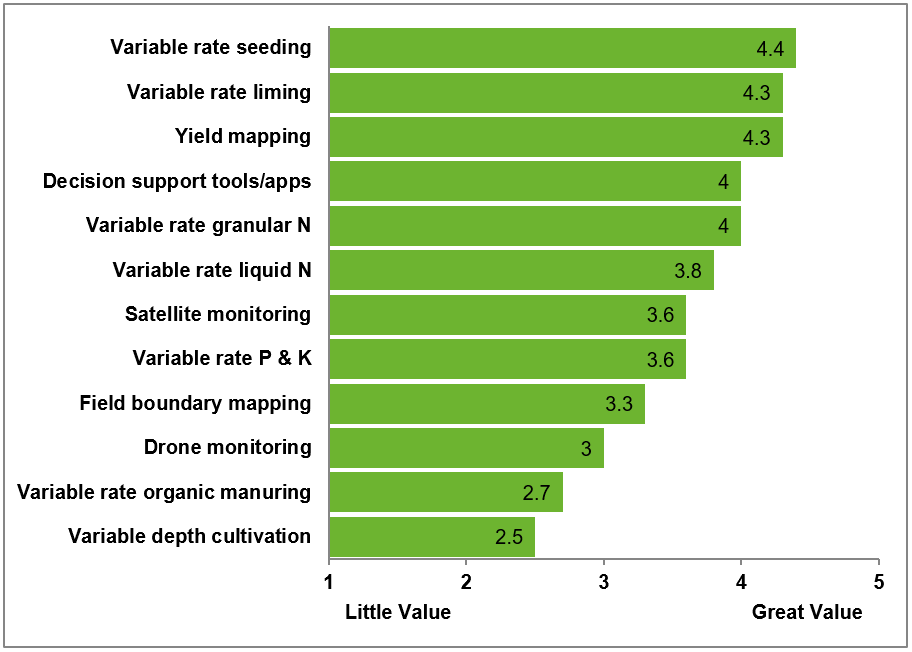Farm network launched to prove and improve digital agronomy technologies
9th Mar 2020

A pioneering UK network of Digital Technology Farms has been established this season to prove the value of current digital agronomy and data-based information systems, demonstrate their most profitable use, and provide the broadest base for future improvements.
The farmer-led initiative involves nine Agrii growers and their agronomists across the country already active in using digital technologies and keen to make the most of them. It is supported by Origin’s state-of-the-art Rhiza digital agronomy business with its market-leading Contour platform.
Spanning a wide range of soil types as well as rotations and farming systems, the Digital Technology Farms will undertake parallel field-scale trials each season using the ADAS Agronōmics precision field data analysis and reporting model to secure the most statistically robust results. Like Agrii’s long-established network of iFarms, they will also explore projects and undertake demonstrations of particular individual and local interest.
Launching the network at Bedfordia Farms in north Bedfordshire, Agrii managing director Jim Rennie said. “Most of the growers we work with up and down the UK share our view of the huge potential precision farming and digital agronomy offer in a world of increasing economic, legislative and climate pressures. And many have been using a wide range of digital technologies for some time now.
“Even the more experienced, though, are finding it hard to see the wood for the trees in making them deliver the goods. They’ve been telling us they need better-researched evidence of the value of technologies like variable rate seeding and fertilisation; better advice on making them work together; and better support in matching them to their own particular farm requirements.
“So we’ve done what we’ve long found works best in responding to our farmers’ needs,” he explained. “We’ve pulled together a group of like-minded growers and their agronomists to share their experiences and concerns, and develop practical farm-based trials and demonstrations to address them.
“The Digital Technology Farms are well-spread across the UK from Somerset and Wiltshire in the south west, to Hereford and Staffordshire in the West Midlands; Bedfordshire, Essex and Lincolnshire in the east; and Yorkshire and Midlothian in the north. That way we have the best possible network of local hubs for down-to-earth trialling and information exchange.
“For the greatest value, all the farms have their soils mapped into management zones; are fully equipped with the most up-to-date satellite imagery, hyper-local weather data and other digital tools on the Contour platform; and are supported by their local Rhiza specialist.”
Variable rate seeding, variable rate liming and yield mapping are the digital technologies currently considered most valuable by the growers involved, according to initial studies undertaken in establishing the network. Decision support tools, variable rate nitrogen, satellite monitoring and variable rate P&K also rated relatively highly
(Figure 1).

Unsurprisingly perhaps, the studies further show the biggest headaches in applying these technologies relate to data – its timeliness, inputting, transfer between equipment and systems and interpretation. Ensuring the whole farm team understands what the technologies are aiming to achieve and knowing the extent to which they are repaying their investment – in time as well as money – are also highlighted as concerns.
The Digital Technology Farm growers identify the following areas as offering their greatest potential to gain from precision farming and digital agronomy:
- Saving costs through better targeted inputs;
- Understanding crop yield potential earlier in the season;
- Identifying agronomy issues earlier than with the naked eye;
- Taking more human error out of the equation;
- Having better tools to support decision-making;
- Reducing time spent managing field operations;
- Providing cost of production and gross margin maps; and, most importantly,
- Improving performance from every part of the field.
“You won’t be surprised to learn that these elements are central to our Digital Technology Farm work,” observed Agrii digital agronomy development manager, Lucy Cottingham at the launch. “After all, everything we do is farmer-led.
“Because we don’t want to run before we walk, our core programme for this first season is focussed on variable rate drilling, variable rate nitrogen application and optimised nutrient application for winter wheat. We also have variable rate drilling trials with spring barley, wheat and oats. In each case, we are comparing the technologies with standard farm-based regimes alongside one another in fields with similar ranges of soil type and condition.
“We are monitoring as many crop parameters as we can from our tramline-scale plots throughout the season, together with local weather data, satellite imagery and other observations.
“All this information will be processed using the ADAS Agronōmics model to reliably ‘prove’ yield effects down to 0.1 t/ha. It will also be used as an additional input to the five-year,
€17.6 million collaborative CONSUS digital, precision agriculture and crop science research partnership between University College Dublin and Origin Enterprises. That way, as well as generating the best possible intelligence for immediate farm use it will provide robust data for Europe’s most advanced digital farming research.
“As a Digital Farming Development Group, our DTF network growers, their agronomists and Rhiza specialists will be continually reviewing their experiences from the trials to fine-tune, develop and extend the scope of our work for future seasons,” Lucy Cottingham pointed out.
“At the same time, we will be sharing our progress and findings as widely as we can though an extended programme of grower meetings and demonstrations. That way, as many people as possible can profit from what we intend to be the most robust evaluations of digital technologies in the industry.”
https://www.agrii.co.uk/blog/digital-technology-farms-network-launch/

